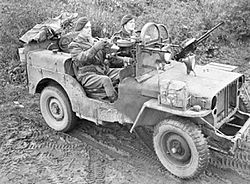Operation Archway facts for kids
Quick facts for kids Operation Archway |
|||||||
|---|---|---|---|---|---|---|---|
| Part of the Western Allied invasion of Germany in the Western Front of the European theatre of World War II | |||||||
 Armed SAS Jeep of the type used in Operation Archway |
|||||||
|
|||||||
| Belligerents | |||||||
| Commanders and leaders | |||||||
| Units involved | |||||||
|
|||||||
| Strength | |||||||
| 300 men | |||||||
Operation Archway was a very important secret mission during World War II. It was one of the biggest operations carried out by the Special Air Service (SAS). The SAS is a special forces unit of the British Army.
This operation was planned to help the British Second Army. They needed to cross the River Rhine into Germany. Operation Archway also supported British armored divisions as they moved deeper into Germany. It continued until the war ended in Europe.
The Archway force was led by Lieutenant Colonel Brian Franks. It included two groups, called squadrons, from the 1st and 2nd Special Air Service.
Contents
Background of the Mission
After the Normandy Landings in France, the 1st and 2nd Special Air Service (SAS) were very busy. They took part in many missions to help the Allied armies advance. These missions included Operation Bulbasket, Operation Houndsworth, Operation Loyton and Operation Wallace.
After these tough missions, both SAS regiments went back to the United Kingdom. They needed to rest and get ready for new tasks. They had many soldiers injured during their time in France.
The Archway Mission
Operation Archway was designed to help a large group of paratroopers. These paratroopers were part of Operation Varsity. They were going to land across the Rhine river. The SAS force for this mission was called Frankforce. It was named after its commander, Lieutenant Colonel Brian Franks. He was the leader of the 2nd Special Air Service.
Frankforce was made up of two strong SAS squadrons. One squadron came from the 1st SAS, and the other from the 2nd SAS.
Frankforce's Equipment and Role
About 300 soldiers were part of Frankforce. They used 75 armed Jeeps. Some of these Jeeps also had 3-inch mortars. They also had trucks to carry supplies.
The 1st SAS squadron had three troops. Each troop had three sections with three Jeeps. They also had a special mortar section. The 2nd SAS squadron was similar but had two troops.
Their first job was to scout ahead in northern Germany. They crossed the Rhine River on March 25. They used special amphibious vehicles called LVT Buffalos.
Supporting Armored Divisions
After crossing the Rhine, Frankforce helped the British Guards Armoured Division. They worked near the Dortmund–Ems Canal. Until the end of the war, Frankforce worked with other British armored divisions. These included the 2nd Welsh Guards, the 8th King's Royal Irish Hussars and the 15th/19th The King's Royal Hussars.
The SAS Jeeps were very useful. They were faster and lighter than the Cromwell tanks used by the armored regiments. This made them perfect for scouting and quick movements.
Bergen-Belsen and the Elbe River
The 1st SAS squadron worked with the 11th Armoured Division. They were among the first British troops to reach Bergen-Belsen concentration camp. They found many people there who needed help. For several days, SAS patrols helped find and arrest war criminals.
By the end of April 1945, the SAS troops reached the Elbe river. There, they met another SAS team from Operation Keystone. This team was a squadron from 2nd SAS.
After the War
When the war in Europe ended, both the 1st and 2nd Special Air Service regiments went back to the United Kingdom. They were getting ready to go to the Far East. They were going to fight against the Japanese Empire.
But before they could train, they had another mission. They went to Norway with the 1st Airborne Division. Their job was to disarm the German soldiers there. This was called Operation Doomsday.
In August 1945, the SAS regiments returned home from Norway. In October 1945, they were officially ended as a military unit. At that time, the British leaders did not think they needed such a special force anymore.
 | Frances Mary Albrier |
 | Whitney Young |
 | Muhammad Ali |

